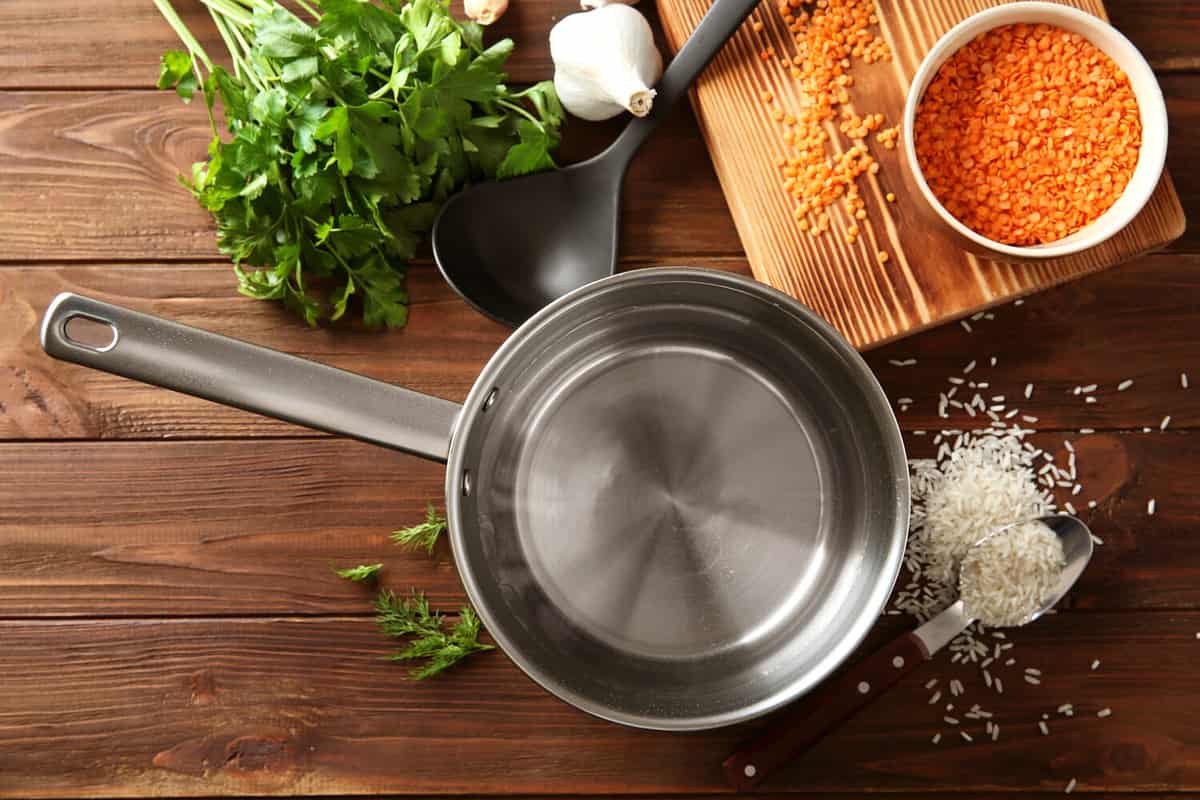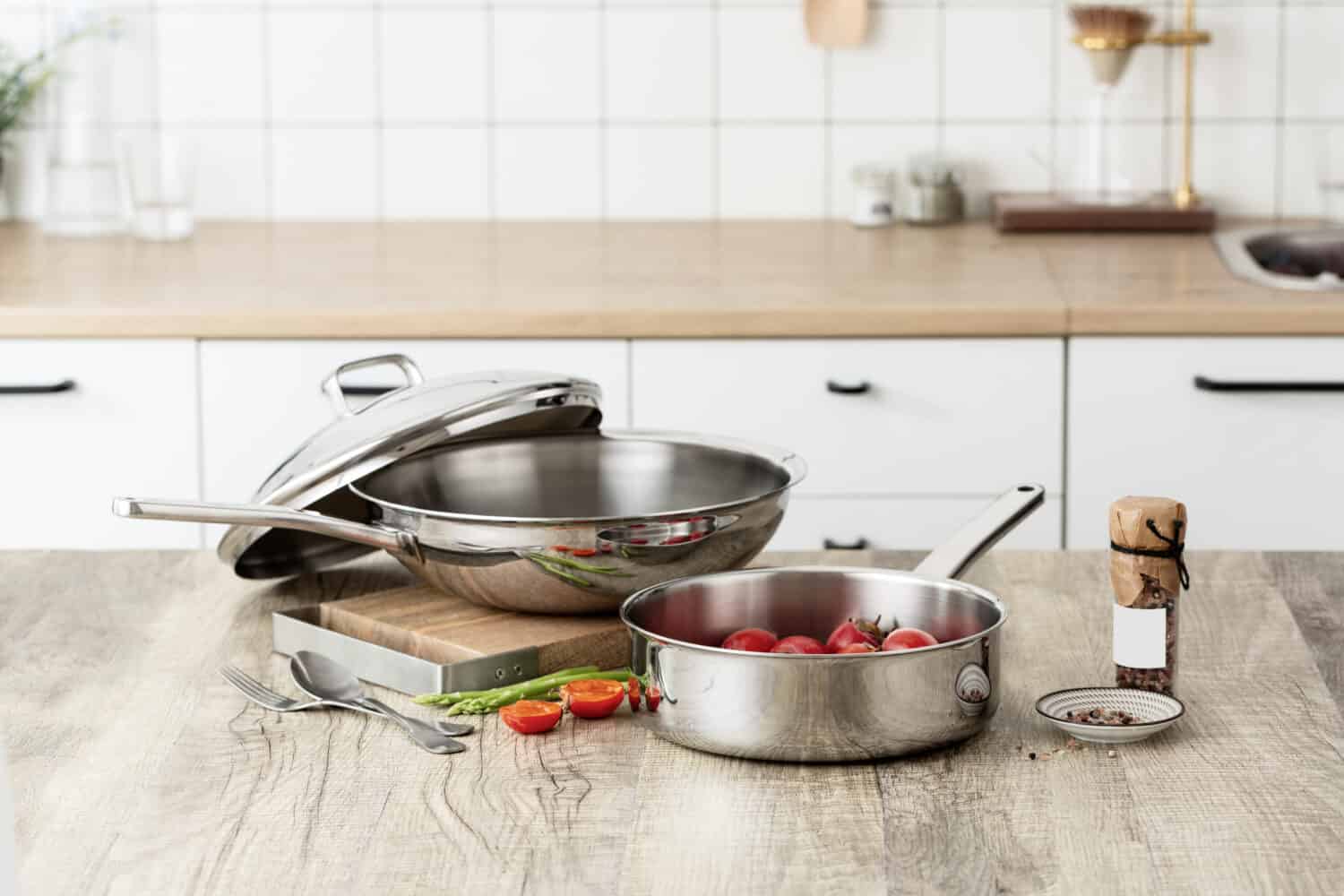Whether you’re looking for new tools for your kitchen, or you’re planning a camping trip and want to know what to take with you, there are numerous types of cookware to choose from. Especially if you’re planning an outdoor adventure, two of the types of cookware you might be comparing are titanium vs. stainless steel.
There are many differences between titanium and stainless steel cookware. The main differences are their cost, weight, and thermal conductivity. Titanium is lighter than stainless steel, but it’s also more expensive. Both titanium and stainless cookware are non-reactive, but titanium is often more durable than stainless steel.
There are numerous differences between titanium and stainless steel. If you’re taking your cookware outdoors or just looking for a new set of pots and pans for your kitchen, keep reading to learn more about the differences between them.
- The must-have convenient reference guide for every home cook!
- Includes more than 8,000 substitutions for ingredients, cookware, and techniques.
- Save time and money on by avoiding trips to grab that "missing" ingredient you don't really need.

Despite the popularity of stainless steel, titanium has become a popular choice for camping and outdoor cooking.
©Raland/Shutterstock.com
Titanium vs. Stainless Steel: What Is the Difference?
Titanium cookware isn’t a popular choice for use in the kitchen. In fact, if you see titanium cookware advertised, it’s typically not 100% titanium. Usually, it’s stainless steel cookware that has a titanium-enforced cooking surface. Also, titanium is sometimes used as a marketing term to convey that cookware is durable. Sometimes the term is used even if it’s not actually made of titanium.
So what is the actual difference between titanium and stainless steel cookware? Titanium cookware is made of a combination of titanium and other metals. It’s definitely more expensive than other cookware, but it’s also considered pretty durable. Stainless steel cookware, on the other hand, is made of steel and chromium.
Stainless steel cookware is low maintenance, which means it’s easy to clean and take care of. It’s also considered a durable choice and is resistant to corrosion and rust. Titanium and stainless steel have that feature in common since titanium is also corrosion-resistant.
When it comes to heat conduction, stainless steel provides a more uniform distribution of heat, while titanium is known for having hot spots. Neither titanium nor stainless steel cookware are naturally non-stick unless they are specifically designated as non-stick cookware. In this case, they typically have a Teflon coating.
Some cookware labeled as non-stick has a titanium non-stick coating that’s made of a combination of titanium and ceramic. Manufacturers add titanium to this type of coating for durability.
Main Differences Between Titanium vs. Stainless Steel Cookware
Stainless steel and titanium cookware are both popular choices, especially when it comes to outdoor cooking. But if you’re trying to decide which one works best for you, consider the main differences between them:
- Titanium is considered more durable
If you’re going to be carrying your cookware in a backpack or in your RV, you need something that’s going to last. Titanium is highly durable, and it’s also corrosion and scratch-resistant, even more so than stainless steel. - Stainless steel is more affordable
While you may know cookware is often considered an investment, how much you’re willing to invest depends on your specific needs. While titanium is more durable, it’s also a more expensive option than stainless steel cookware. - Titanium is lighter
Titanium has become a solid alternative to cast iron for outdoor cooking because of how lightweight it is. Even compared to stainless steel, titanium is lighter and easier to carry around, which is necessary if you’re to be carrying your belongings with you. - Titanium heats up faster
While stainless steel provides a more even heating surface, titanium heats up faster. This makes it ideal for scenarios where you don’t have a consistent heating surface or many resources. While it’s not the best for cooking full meals, if you’re looking for something to boil water or heat up food on the go, titanium has the heating abilities you need.
There are many more differences between titanium and stainless steel cookware, but which one works best depends on how you’ll be using it. Let’s take a closer look at the durability, cost, and heat conduction of these types of cookware.
Titanium vs. Stainless Steel: Which Is More Durable?
Considering how much it can cost to replace your entire kitchen set, one of the first questions you might ask is how durable is it. Both titanium and stainless steel cookware are highly durable. However, when you compare them, titanium can often withstand more without scratching or breaking.
While stainless steel is resistant to rust or corrosion, titanium is less likely to scratch. It’s stronger than stainless steel, especially when you look at the ratio of strength to weight. Titanium is lighter but is also more durable.
Cost of Titanium vs. Stainless Steel
Making an investment in new cookware is often worth it if you can invest in high-quality tools that will last for years. Even with stainless steel, if you buy high-quality stainless steel, it can last for decades.
It’s important to keep in mind that when it comes to the cost of cookware, titanium is going to be more expensive. If you’re purchasing 100% titanium cookware, the price will be higher, but this fully titanium cookware generally for everyday kitchen use.
Stainless steel can be a relatively affordable option if you’re looking for new pots or pans for indoor cooking. However, you might be considering the investment of titanium if you’re using it while traveling, backpacking, or hiking.
- The must-have convenient reference guide for every home cook!
- Includes more than 8,000 substitutions for ingredients, cookware, and techniques.
- Save time and money on by avoiding trips to grab that "missing" ingredient you don't really need.
Which Conducts Heat Better: Titanium vs. Stainless Steel
When it comes to heat conduction, this is an important factor to consider, especially if you’re using the cookware outside where you have limited resources or time. While stainless steel pots or pans can prevent uneven cooking in the kitchen, they don’t conduct heat as well as titanium and they’re not going to work as well over certain heat sources.
Titanium will heat up faster than stainless steel but the heat won’t necessarily spread as evenly. Which one works best will depend on what you plan on cooking. If you need to boil water or simply heat up food over a fire, titanium is your best bet.

Both stainless steel and titanium are safe for cooking even with acidic ingredients.
©Africa Studio/Shutterstock.com
Is Titanium Safer Than Stainless Steel Cookware?
With any type of cookware, safety is also an issue. Both titanium and stainless steel are non-reactive. This means that even when you cook with acidic ingredients, such as citrus, the materials in won’t react to the ingredients.
With reactive materials, such as those in aluminum or copper, using acidic ingredients creates a chemical reaction in the pan. This can often lead to a metallic taste in your food but this isn’t a concern with stainless steel or titanium.
The other thing to consider when it comes to safety is the coating on the pan. If you purchase stainless steel, ones with a non-stick coating often include a Teflon coating on the surface. In this case, the non-stick coating has synthetic ingredients. While the current standard for Teflon coating is safe, it can create toxic fumes that may make you sick if heated above 500 degrees.
Fully-clad stainless steel doesn’t have this synthetic coating. Without the coating, it won’t naturally be non-stick, but you can season the pan to create a non-stick surface.
Which Is Better: Titanium or Stainless Steel?
The debate between titanium and stainless steel mostly exists when talking about outdoor cooking. While stainless steel is going to be a better option for indoor cooking, titanium wins the day when it comes to camping, hiking, and other adventures.
Cast iron is often the go-to for outdoor cooking, but titanium has started to become more popular. Even though there are many benefits to cast iron cookware, the weight alone makes it difficult to travel with. This is especially true when backpacking or hiking. Titanium has become a strong alternative for those who need something lightweight that’s also durable enough to withstand the great outdoors.
The image featured at the top of this post is ©mirageart/Shutterstock.com

